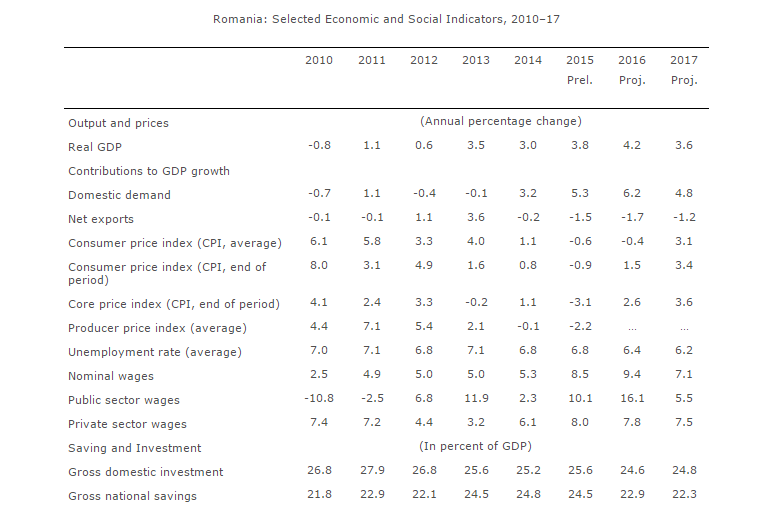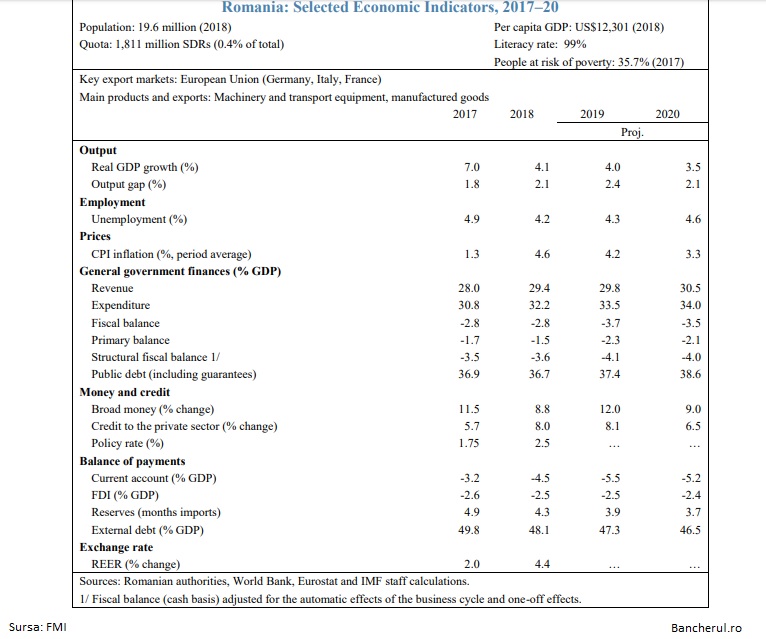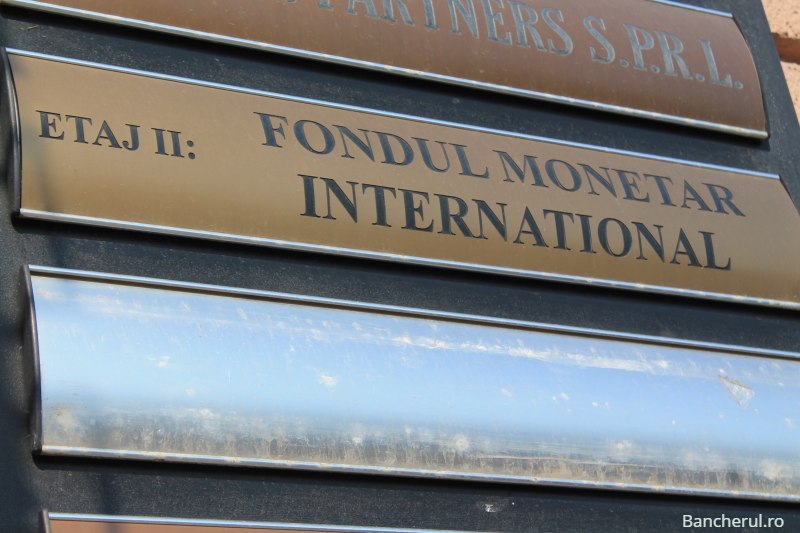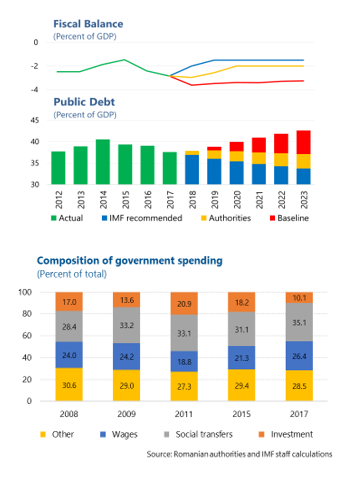IMF Executive Board Concludes 2016 Article IV Consultation with Romania
 Autor: Bancherul.ro
Autor: Bancherul.ro
2016-05-11 17:13
IMF Executive Board Concludes 2016 Article IV Consultation with Romania
Press Release No. 16/210
May 11, 2016
On May 9, 2016, the Executive Board of the International Monetary Fund (IMF) concluded the Article IV consultation (1) with Romania.
The Romanian economy is on a cyclical upswing supported by strong domestic demand. Recent hikes in minimum and public wages, record low interest rates, low fuel prices, and a Value-Added Tax (VAT) reduction have boosted private consumption. A catch-up in absorption of European Union (EU) funds has contributed to an increase in investment.
Annual headline inflation turned negative in June 2015 following a sharp reduction in VAT on food items from 24 to 9 percent. However, adjusting for the VAT changes, underlying inflation was 2.4 percent (year-over-year) in March 2016 (Eurostat estimate) despite the recent fall in international commodity prices and low inflation in the euro area.
There has been welcome progress in reducing banking sector non-performing loans.
Growth is expected to reach 4.2 percent in 2016—largely due to the one-off stimulus to consumption from the recent fiscal expansion—and decelerate to 3.6 percent in 2017.
Underlying inflation is expected to continue growing and the current account deficit to widen further because of import growth.
Two main risks to the economic outlook are electoral and external uncertainties. On the domestic side, populist measures in an election year could negatively affect market confidence and undermine investment. On the external side, a deterioration in emerging market risk perception could trigger capital outflows, a depreciation of the currency, and a substantial increase in the external debt-to-GDP ratio.
Maintaining adequate reserve levels, a flexible exchange rate regime, and fiscal buffers will be key in mitigating risks. Improving Romania’s long-term growth prospects to close the gap with advanced EU countries will depend on maintaining prudent macroeconomic policies and advancing the pace of structural reforms.
Executive Board Assessment (2)
Executive Directors welcomed the significant progress in reducing vulnerabilities after the global financial crisis, notably the marked improvements in fiscal and external balances and in the resilience of the banking sector.
Directors observed, however, that there are downside risks to the economic outlook. They also noted with concern the recent procyclical fiscal relaxation, changes in financial sector legislation that could adversely affect financial stability, and the slowdown in structural reforms.
Directors underscored the importance of implementing prudent economic policies and regaining the structural reform momentum to preserve Romania’s hard-won gains and raise medium-term growth potential.
Directors emphasized the need to ensure fiscal sustainability and the credibility of the fiscal framework. In light of the large fiscal relaxation adopted last year, it is crucial that fiscal policy is anchored on a credible debt reduction path going forward.
Repealing the planned tax reductions or postponing them until offsetting measures are identified will help achieve these objectives.
Directors also underscored the importance of strengthening fiscal institutions and strictly enforcing fiscal rules and the fiscal responsibility law. They welcomed recent steps to enhance transparency in public spending, and called on the authorities to accelerate complementary reforms to strengthen the spending review unit, pass the procurement law, improve the targeting of social protection schemes, and strengthen public administration more broadly.
Directors highlighted the urgency of stepping up structural reforms to unlock Romania’s potential growth, particularly by improving the efficiency of public investment and the business climate. They called for intensified efforts to strengthen the corporate governance of state-owned enterprises—including through passage of the draft legislation in parliament—and improve the planning and utilization of EU funds.
Directors also encouraged further reforms in tax administration, focusing on large taxpayers and making tax administration more business friendly more generally. It will also be important that policies on public and minimum wages take into account fiscal space, productivity growth, and competitiveness considerations. Directors commended the authorities for the progress in fighting corruption and encouraged them to address remaining weaknesses.
Directors concurred that a tightening bias in monetary policy is appropriate given current inflation projections. They recommended that the authorities begin reducing the gap between the market and policy rates, absorb liquidity from the market, and further narrow the interest rate corridor, while continuing to enhance the effectiveness of the monetary policy framework. Maintaining adequate international reserves remains crucial in light of elevated uncertainty in global financial markets.
Directors welcomed the significant progress in strengthening the financial sector, particularly in reducing non-performing loans. Priorities going forward are to pursue predictable and market-friendly policies and ensure proper oversight. In this context, Directors cautioned that poorly targeted measures for providing debt relief to borrowers could undermine financial stability, legal predictability, and credit growth.
They called on the authorities to reconsider the recently passed measures and to put adequate safeguards in place. Sustained efforts to further deepen financial intermediation are critical to foster private investment and growth.
(1) Under Article IV of the IMF's Articles of Agreement, the IMF holds bilateral discussions with members, usually every year. A staff team visits the country, collects economic and financial information, and discusses with officials the country's economic developments and policies. On return to headquarters, the staff prepares a report, which forms the basis for discussion by the Executive Board.
(2) At the conclusion of the discussion, the Managing Director, as Chairman of the Board, summarizes the views of Executive Directors, and this summary is transmitted to the country's authorities. An explanation of any qualifiers used in summings up can be found here: http://www.imf.org/external/np/sec/misc/qualifiers.htm.
Source: IMF statement
Taguri: FMI reclamatie banca National Bank of Romania (NBR) banci pentru locuinte
Comentarii
JulesTraducerea
Meritam si noi o traducere profesionista?
Adauga un comentariu
Adauga un comentariu folosind contul de Facebook
Alte stiri din categoria: Noutati FMI
FMI cere BNR sa intareasca politica monetara iar Guvernului sa modifice legea pensiilor
Fondul Monetar International (FMI) cere Bancii Nationale a Romaniei (BNR) sa intareasca politica monetara, pentru a struni inflatia in crestere, iar Guvernului sa modifice legea pensiilor, care ar putea submina stabilitatea fiscala. "Noua lege a pensiilor ar putea submina detalii
FMI: majorarea salariilor din sectorul public si legea pensiilor ar trebui reevaluate
FMI își încheie vizita în România (comunicat de presa): Comunicatele de presă de final de misiune cuprind declarații ale echipei FMI prin care se transmit constatările preliminare după vizita într-o țară. Opiniile care se regăsesc exprimate în detalii
IMF statement of the 2018 Article IV Mission to Romania
The Romanian economy is growing strongly, unemployment has fallen to a record low, and the financial sector is improving. But without policy changes, growth will turn increasingly fragile, according to an IMF press release. For one, inflation could increase further, with possible social detalii
Jaewoo Lee, new IMF mission chief for Romania and Bulgaria
The Regional Resident Representative of the International Monetary Fund (IMF) in Romania and Bulgaria, Alejandro Hajdenberg, made the following statement today: "I am very pleased to announce that Jaewoo Lee has been appointed as the new mission chief for Romania and Bulgaria. He detalii
- IMF concludes article IV consultation with Romania
- IMF statement on the stability of the banking system in Ukraine
- Global House Prices: Time to Worry Again?
- FMI: Raport de asistenta tehnica - Imbunatatirea administrarii riscului de conformare pe care il prezinta marii contribuabili
- IMF Director Christine Lagarde Calls for Broad-based Policy Effort to Reinvigorate Growth
- Speech by Janet Yellen on current conditions and the outlook for the U.S. economy
- IMF Executive Board Concludes 2016 Article IV Consultation with Romania
Profil de Bancher
-
Marius Trif, Director General
Carpatica Invest

Marius Trif, Directorul General al Carpatica ... vezi profil
Criza COVID-19
- In majoritatea unitatilor BRD se poate intra fara certificat verde
- La BCR se poate intra fara certificat verde
- Firmele, obligate sa dea zile libere parintilor care stau cu copiii in timpul pandemiei de coronavirus
- CEC Bank: accesul in banca se face fara certificat verde
- Cum se amana ratele la creditele Garanti BBVA
Topuri Banci
- Topul bancilor dupa active si cota de piata in perioada 2022-2015
- Topul bancilor cu cele mai mici dobanzi la creditele de nevoi personale
- Topul bancilor la active in 2019
- Topul celor mai mari banci din Romania dupa valoarea activelor in 2018
- Topul bancilor dupa active in 2017
Asociatia Romana a Bancilor (ARB)
- Băncile din România nu au majorat comisioanele aferente operațiunilor în numerar
- Concurs de educatie financiara pentru elevi, cu premii in bani
- Creditele acordate de banci au crescut cu 14% in 2022
- Romanii stiu educatie financiara de nota 7
- Gradul de incluziune financiara in Romania a ajuns la aproape 70%
ROBOR
- ROBOR: ce este, cum se calculeaza, ce il influenteaza, explicat de Asociatia Pietelor Financiare
- ROBOR a scazut la 1,59%, dupa ce BNR a redus dobanda la 1,25%
- Dobanzile variabile la creditele noi in lei nu scad, pentru ca IRCC ramane aproape neschimbat, la 2,4%, desi ROBOR s-a micsorat cu un punct, la 2,2%
- IRCC, indicele de dobanda pentru creditele in lei ale persoanelor fizice, a scazut la 1,75%, dar nu va avea efecte imediate pe piata creditarii
- Istoricul ROBOR la 3 luni, in perioada 01.08.1995 - 31.12.2019
Taxa bancara
- Normele metodologice pentru aplicarea taxei bancare, publicate de Ministerul Finantelor
- Noul ROBOR se va aplica automat la creditele noi si prin refinantare la cele in derulare
- Taxa bancara ar putea fi redusa de la 1,2% la 0,4% la bancile mari si 0,2% la cele mici, insa bancherii avertizeaza ca indiferent de nivelul acesteia, intermedierea financiara va scadea iar dobanzile vor creste
- Raiffeisen anunta ca activitatea bancii a incetinit substantial din cauza taxei bancare; strategia va fi reevaluata, nu vor mai fi acordate credite cu dobanzi mici
- Tariceanu anunta un acord de principiu privind taxa bancara: ROBOR-ul ar putea fi inlocuit cu marja de dobanda a bancilor
Statistici BNR
- Deficitul contului curent după primele două luni, mai mare cu 25%
- Deficitul contului curent, -0,39% din PIB după prima lună a anului
- Deficitul contului curent, redus cu 17%
- Inflatia a încheiat anul 2023 la 6,61%, semnificativ sub prognoza oficială
- Deficitul contului curent, redus cu o cincime după primele zece luni ale anului
Legislatie
- Legea nr. 311/2015 privind schemele de garantare a depozitelor şi Fondul de garantare a depozitelor bancare
- Rambursarea anticipata a unui credit, conform OUG 50/2010
- OUG nr.21 din 1992 privind protectia consumatorului, actualizata
- Legea nr. 190 din 1999 privind creditul ipotecar pentru investiții imobiliare
- Reguli privind stabilirea ratelor de referinţă ROBID şi ROBOR
Lege plafonare dobanzi credite
- BNR propune Parlamentului plafonarea dobanzilor la creditele bancilor intre 1,5 si 4 ori peste DAE medie, in functie de tipul creditului; in cazul IFN-urilor, plafonarea dobanzilor nu se justifica
- Legile privind plafonarea dobanzilor la credite si a datoriilor preluate de firmele de recuperare se discuta in Parlament (actualizat)
- Legea privind plafonarea dobanzilor la credite nu a fost inclusa pe ordinea de zi a comisiilor din Camera Deputatilor
- Senatorul Zamfir, despre plafonarea dobanzilor la credite: numai bou-i consecvent!
- Parlamentul dezbate marti legile de plafonare a dobanzilor la credite si a datoriilor cesionate de banci firmelor de recuperare (actualizat)
Anunturi banci
- Bancile comunica automat cu ANAF situatia popririlor
- BRD bate recordul la credite de consum, in ciuda dobanzilor mari, si obtine un profit ridicat
- CEC Bank a preluat Fondul de Garantare a Creditului Rural
- BCR aproba credite online prin aplicatia George, dar contractele se semneaza la banca
- Aplicatia Eximbank, indisponibila temporar
Analize economice
- România - prima în UE la inflație, prin efect de bază
- Deficitul comercial lunar a revenit peste cota de 2 miliarde euro
- România, 78% din media UE la PIB/locuitor în 2023
- România - prima în UE la inflație, prin efect de bază
- Inflația anuală, în scădere la 7,23%
Ministerul Finantelor
- Datoria publică, imediat sub pragul de 50% din PIB la începutul anului 2024
- Deficitul bugetar, deja -1,67% din PIB după primele două luni
- Datoria publică, sub pragul de 50% din PIB la finele anului 2023
- Deficitul bugetar, din ce în ce mai mare la început de an
- Deficitul bugetar după 8 luni, încă mai mare față de rezultatul din anul trecut
Biroul de Credit
- FUNDAMENTAREA LEGALITATII PRELUCRARII DATELOR PERSONALE IN SISTEMUL BIROULUI DE CREDIT
- BCR: prelucrarea datelor personale la Biroul de Credit
- Care banci si IFN-uri raporteaza clientii la Biroul de Credit
- Ce trebuie sa stim despre Biroul de Credit
- Care este procedura BCR de raportare a clientilor la Biroul de Credit
Procese
- Un client Credius obtine in justitie anularea creditului, din cauza dobanzii prea mari
- Hotararea judecatoriei prin care Aedificium, fosta Raiffeisen Banca pentru Locuinte, si statul sunt obligati sa achite unui client prima de stat
- Decizia Curtii de Apel Bucuresti in procesul dintre Raiffeisen Banca pentru Locuinte si Curtea de Conturi
- Vodafone, obligata de judecatori sa despagubeasca un abonat caruia a refuzat sa-i repare un telefon stricat sau sa-i dea banii inapoi (decizia instantei)
- Taxa de reziliere a abonamentului Vodafone inainte de termen este ilegala (decizia definitiva a judecatorilor)
Stiri economice
- Producția industrială pe februarie, cu aproape 7% sub cea din urmă cu cinci ani
- Inflația anuală a revenit la nivelul de la finele anului anterior
- Pensia reală de asigurări sociale de stat a crescut anul trecut cu 2,9%
- Producția de cereale boabe pe 2023, cu o zecime mai mare față de anul precedent
- România, țara UE cu cea mai mare creștere a costului salarial
Statistici
- Care este valoarea salariului minim brut si net pe economie in 2024?
- Cat va fi salariul brut si net in Romania in 2024, 2025, 2026 si 2027, conform prognozei oficiale
- România, pe ultimul loc în UE la evoluția productivității muncii în agricultură
- INS: Veniturile romanilor au crescut anul trecut cu 10%. Banii de mancare, redistribuiti cu precadere spre locuinta, transport si haine
- Inflatia anuala - 13,76% in aprilie 2022 si va ramane cu doua cifre pana la mijlocul anului viitor
FNGCIMM
- Programul IMM Invest continua si in 2021
- Garantiile de stat pentru credite acordate de FNGCIMM au crescut cu 185% in 2020
- Programul IMM invest se prelungeste pana in 30 iunie 2021
- Firmele pot obtine credite bancare garantate si subventionate de stat, pe baza facturilor (factoring), prin programul IMM Factor
- Programul IMM Leasing va fi operational in perioada urmatoare, anunta FNGCIMM
Calculator de credite
- ROBOR la 3 luni a scazut cu aproape un punct, dupa masurile luate de BNR; cu cat se reduce rata la credite?
- In ce mall din sectorul 4 pot face o simulare pentru o refinantare?
Noutati BCE
- Acord intre BCE si BNR pentru supravegherea bancilor
- Banca Centrala Europeana (BCE) explica de ce a majorat dobanda la 2%
- BCE creste dobanda la 2%, dupa ce inflatia a ajuns la 10%
- Dobânda pe termen lung a continuat să scadă in septembrie 2022. Ecartul față de Polonia și Cehia, redus semnificativ
- Rata dobanzii pe termen lung pentru Romania, in crestere la 2,96%
Noutati EBA
- Bancile romanesti detin cele mai multe titluri de stat din Europa
- Guidelines on legislative and non-legislative moratoria on loan repayments applied in the light of the COVID-19 crisis
- The EBA reactivates its Guidelines on legislative and non-legislative moratoria
- EBA publishes 2018 EU-wide stress test results
- EBA launches 2018 EU-wide transparency exercise
Noutati FGDB
- Banii din banci sunt garantati, anunta FGDB
- Depozitele bancare garantate de FGDB au crescut cu 13 miliarde lei
- Depozitele bancare garantate de FGDB reprezinta doua treimi din totalul depozitelor din bancile romanesti
- Peste 80% din depozitele bancare sunt garantate
- Depozitele bancare nu intra in campania electorala
CSALB
- La CSALB poti castiga un litigiu cu banca pe care l-ai pierde in instanta
- Negocierile dintre banci si clienti la CSALB, in crestere cu 30%
- Sondaj: dobanda fixa la credite, considerata mai buna decat cea variabila, desi este mai mare
- CSALB: Romanii cu credite caută soluții pentru reducerea ratelor. Cum raspund bancile
- O firma care a facut un schimb valutar gresit s-a inteles cu banca, prin intermediul CSALB
First Bank
- Ce trebuie sa faca cei care au asigurare la credit emisa de Euroins
- First Bank este reprezentanta Eurobank in Romania: ce se intampla cu creditele Bancpost?
- Clientii First Bank pot face plati prin Google Pay
- First Bank anunta rezultatele financiare din prima jumatate a anului 2021
- First Bank are o noua aplicatie de mobile banking
Noutati FMI
- FMI: criza COVID-19 se transforma in criza economica si financiara in 2020, suntem pregatiti cu 1 trilion (o mie de miliarde) de dolari, pentru a ajuta tarile in dificultate; prioritatea sunt ajutoarele financiare pentru familiile si firmele vulnerabile
- FMI cere BNR sa intareasca politica monetara iar Guvernului sa modifice legea pensiilor
- FMI: majorarea salariilor din sectorul public si legea pensiilor ar trebui reevaluate
- IMF statement of the 2018 Article IV Mission to Romania
- Jaewoo Lee, new IMF mission chief for Romania and Bulgaria
Noutati BERD
- Creditele neperformante (npl) - statistici BERD
- BERD este ingrijorata de investigatia autoritatilor din Republica Moldova la Victoria Bank, subsidiara Bancii Transilvania
- BERD dezvaluie cat a platit pe actiunile Piraeus Bank
- ING Bank si BERD finanteaza parcul logistic CTPark Bucharest
- EBRD hails Moldova banking breakthrough
Noutati Federal Reserve
- Federal Reserve anunta noi masuri extinse pentru combaterea crizei COVID-19, care produce pagube "imense" in Statele Unite si in lume
- Federal Reserve urca dobanda la 2,25%
- Federal Reserve decided to maintain the target range for the federal funds rate at 1-1/2 to 1-3/4 percent
- Federal Reserve majoreaza dobanda de referinta pentru dolar la 1,5% - 1,75%
- Federal Reserve issues FOMC statement
Noutati BEI
- BEI a redus cu 31% sprijinul acordat Romaniei in 2018
- Romania implements SME Initiative: EUR 580 m for Romanian businesses
- European Investment Bank (EIB) is lending EUR 20 million to Agricover Credit IFN
Mobile banking
- Comisioanele BRD pentru MyBRD Mobile, MyBRD Net, My BRD SMS
- Termeni si conditii contractuale ale serviciului You BRD
- Recomandari de securitate ale BRD pentru utilizatorii de internet/mobile banking
- CEC Bank - Ghid utilizare token sub forma de card bancar
- Cinci banci permit platile cu telefonul mobil prin Google Pay
Noutati Comisia Europeana
- Avertismentul Comitetului European pentru risc sistemic (CERS) privind vulnerabilitățile din sistemul financiar al Uniunii
- Cele mai mici preturi din Europa sunt in Romania
- State aid: Commission refers Romania to Court for failure to recover illegal aid worth up to €92 million
- Comisia Europeana publica raportul privind progresele inregistrate de Romania in cadrul mecanismului de cooperare si de verificare (MCV)
- Infringements: Commission refers Greece, Ireland and Romania to the Court of Justice for not implementing anti-money laundering rules
Noutati BVB
- BET AeRO, primul indice pentru piata AeRO, la BVB
- Laptaria cu Caimac s-a listat pe piata AeRO a BVB
- Banca Transilvania plateste un dividend brut pe actiune de 0,17 lei din profitul pe 2018
- Obligatiunile Bancii Transilvania se tranzactioneaza la Bursa de Valori Bucuresti
- Obligatiunile Good Pople SA (FRU21) au debutat pe piata AeRO
Institutul National de Statistica
- Comerțul cu amănuntul, în expansiune la început de an
- România, pe locul 2 în UE la creșterea comerțului cu amănuntul în ianuarie 2024
- Comerțul cu amănuntul, în creștere cu 1,9% pe anul 2023
- Comerțul cu amănuntul, în creștere pe final de an
- Comerțul cu amănuntul, stabilizat la +2% față de anul anterior
Informatii utile asigurari
- Data de la care FGA face plati pentru asigurarile RCA Euroins: 17 mai 2023
- Asigurarea împotriva dezastrelor, valabilă și in caz de faliment
- Asiguratii nu au nevoie de documente de confirmare a cutremurului
- Cum functioneaza o asigurare de viata Metropolitan pentru un credit la Banca Transilvania?
- Care sunt documente necesare pentru dosarul de dauna la Cardif?
ING Bank
- La ING se vor putea face plati instant din decembrie 2022
- Cum evitam tentativele de frauda online?
- Clientii ING Bank trebuie sa-si actualizeze aplicatia Home Bank pana in 20 martie
- Obligatiunile Rockcastle, cel mai mare proprietar de centre comerciale din Europa Centrala si de Est, intermediata de ING Bank
- ING Bank transforma departamentul de responsabilitate sociala intr-unul de sustenabilitate
Ultimele Comentarii
-
Refuz de plată la o benzinărie suma de 103 euro
Mi s-au retras de două ori suma de 48 euro și suma de 103 euro suma corectă este de 48 de euro ... detalii
-
nevoia de banci
De ce credeti ca acum nu mai avem nevoie de banci si firme de asigurari? Pentru ca acum avem ... detalii
-
Mda
ACUM nu e nevoie de asa ceva .. acum vreo 20 de ani era nevoie ... ACUM de fapt nu mai e asa multa ... detalii
-
oprire pe salariu garanti bank
mi sa virat 2500de lei din care a fost oprit 850 de lei urmand sa mi se deblocheze restul sumei ... detalii
-
Amânare rate
Buna ziua, Am rămas în urma cu ratele , va rog frumos sa ma ajutați cumva , soțul a pierdut ... detalii










